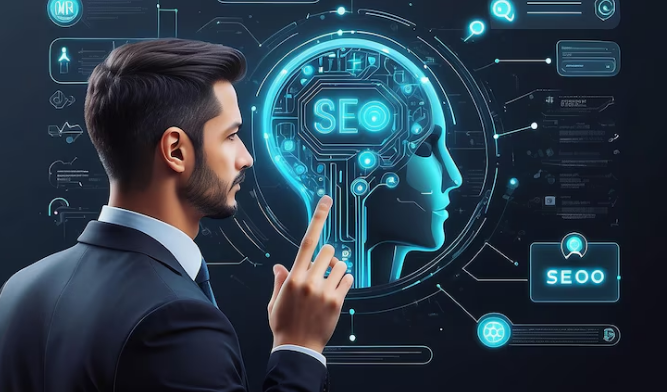Introduction
The landscape of search engine optimization (SEO) is constantly evolving, driven by advancements in technology and changes in how search engines rank content. One of the most significant developments in recent years has been the rise of artificial intelligence (AI) in content creation. As AI-driven content generation tools become more sophisticated, they are reshaping the way businesses approach SEO, content marketing, and digital strategy as a whole. This article explores the impact of AI-driven content generation on SEO in 2024, examining the benefits, challenges, and future implications for businesses and marketers.
The Rise of AI-Driven Content Generation
AI-driven content generation refers to the use of machine learning algorithms and natural language processing (NLP) to create written content automatically. These tools have advanced significantly in recent years, with AI models like OpenAI’s GPT-4 and others capable of producing high-quality, human-like text based on a given prompt. As a result, businesses are increasingly leveraging AI to create blog posts, articles, product descriptions, and other forms of content at scale.
The adoption of AI-driven content generation has been fueled by several factors. First, the demand for content has never been higher, with businesses needing to produce large volumes of material to stay competitive in search engine rankings. AI tools offer a cost-effective solution to this challenge, enabling companies to generate content quickly and efficiently. Second, the quality of AI-generated content has improved to the point where it is often indistinguishable from content written by human authors. This has made AI a viable option for a wide range of content types, from simple product descriptions to more complex articles and thought leadership pieces.
Benefits of AI-Driven Content for SEO
The use of AI-driven content generation offers several benefits for SEO. These benefits include:
1. Scalability
“One of the primary advantages of AI-driven content generation is its ability to scale content production. Traditional content creation is time-consuming and resource-intensive, requiring businesses to invest in writing, editing, and proofreading. AI tools, on the other hand, can generate large volumes of content in a fraction of the time, making it easier for businesses to meet their content needs and maintain a consistent publishing schedule.
For SEO, this scalability is crucial. Search engines like Google prioritize websites that regularly update their content and provide fresh, relevant information. By using AI to generate content at scale, businesses can ensure that their websites remain active and up-to-date, which can help improve their search engine rankings.” – Daniel Foley, Co-founder at Assertive Media
2. Content Optimization
AI-driven content generation tools are not just capable of creating text; they can also optimize content for SEO. Many AI tools come equipped with features that allow them to analyze keywords, optimize meta tags, and ensure that content adheres to SEO best practices. This means that businesses can create content that is not only engaging and informative but also optimized for search engines from the outset.
Additionally, AI can analyze existing content and suggest improvements or updates based on current SEO trends. This can help businesses keep their content relevant and aligned with the latest search engine algorithms, which is essential for maintaining high rankings.
3. Personalization
“Personalization has become a key factor in modern SEO and content marketing strategies. AI-driven content generation allows businesses to create personalized content at scale, tailoring messages to specific audiences based on their preferences, behaviors, and search intent. This level of personalization can improve user engagement, increase click-through rates, and ultimately drive more traffic to a website.
For example, AI can generate personalized product descriptions for different customer segments, ensuring that each description resonates with the target audience. Similarly, AI can create localized content for different regions, optimizing it for local search terms and cultural nuances. This level of customization is difficult to achieve with traditional content creation methods, making AI a valuable tool for businesses looking to enhance their SEO efforts.” – Justin Carpenter, franchise owner of Modern Maids Dallas
Challenges of AI-Driven Content for SEO
While AI-driven content generation offers numerous benefits, it also presents several challenges that businesses must navigate. These challenges include:
1. Quality Control
Despite the advancements in AI technology, the quality of AI-generated content can vary. While AI can produce content that is grammatically correct and coherent, it may lack the depth, creativity, and insight that human authors can provide. This can be particularly problematic for businesses that rely on thought leadership content or need to convey complex ideas.
To address this challenge, businesses must implement rigorous quality control measures when using AI-driven content generation tools. This may involve having human editors review and refine AI-generated content to ensure that it meets the desired standards. Additionally, businesses should be cautious about over-relying on AI for content creation, particularly for more nuanced or sensitive topics.
2. Duplicate Content
One of the risks associated with AI-driven content generation is the potential for duplicate content. Because AI tools often rely on existing data and content to generate new text, there is a risk that the resulting content may be too similar to other content on the web. Duplicate content can negatively impact SEO, as search engines may penalize websites that publish content that is not original.
To mitigate this risk, businesses should use AI tools that have built-in plagiarism detection features. Additionally, they should ensure that AI-generated content is thoroughly reviewed and modified to add unique value before it is published. This can help avoid potential SEO penalties and maintain the integrity of the website’s content.
3. Ethical Considerations
The use of AI in content creation raises several ethical considerations, particularly in terms of transparency and authenticity. For example, should businesses disclose that their content was generated by AI? How does AI-generated content impact the role of human writers and content creators?
These ethical questions are becoming increasingly important as AI-driven content generation becomes more widespread. Businesses must consider how they will address these issues, both in terms of their content strategy and their broader brand values. Transparency about the use of AI and a commitment to ethical content practices will be crucial for maintaining trust with audiences.
The Future of AI-Driven Content in SEO
As AI-driven content generation continues to evolve, its impact on SEO is likely to grow. Several trends and developments are expected to shape the future of AI-driven content in the SEO landscape:
1. Integration with Other AI Technologies
AI-driven content generation is just one piece of the puzzle in the broader AI ecosystem. As AI technologies continue to advance, we can expect greater integration between content generation tools and other AI-powered platforms, such as AI-driven SEO tools, customer relationship management (CRM) systems, and analytics platforms.
This integration will allow businesses to create highly targeted and optimized content that is informed by real-time data and insights. For example, AI could analyze customer behavior data from a CRM system and use it to generate personalized content that aligns with the customer’s preferences and search intent. This level of integration will enable businesses to create more effective and data-driven SEO strategies.
2. AI-Generated Multimedia Content
While AI-driven content generation has primarily focused on text, advancements in AI are making it possible to generate other forms of content, such as images, videos, and audio. AI-generated multimedia content has the potential to revolutionize SEO, as search engines increasingly prioritize rich media in their rankings.
For example, AI-generated videos could be used to create engaging explainer videos or product demonstrations, while AI-generated images could enhance blog posts and social media content. As multimedia content becomes more important for SEO, businesses will need to explore how AI can help them create and optimize these types of content.
3. The Role of Human-AI Collaboration
As AI-driven content generation becomes more sophisticated, the role of human writers and content creators will evolve. Rather than replacing human creators, AI is likely to become a tool that enhances their work, enabling them to produce content more efficiently and effectively.
Human-AI collaboration will be key to achieving the best results in content creation. AI can handle repetitive and time-consuming tasks, such as keyword research and content optimization, while human creators focus on adding creativity, insight, and emotional resonance to the content. This collaboration will allow businesses to create high-quality content that is both optimized for SEO and deeply engaging for audiences.
Conclusion
AI-driven content generation is reshaping the SEO landscape in 2024, offering businesses new opportunities to scale content production, optimize their content, and personalize their messaging. However, the use of AI in content creation also presents challenges, including quality control, duplicate content, and ethical considerations. As AI technology continues to advance, businesses will need to navigate these challenges while leveraging the benefits of AI-driven content to stay competitive in the digital landscape.
The future of AI-driven content in SEO will likely involve greater integration with other AI technologies, the expansion of AI-generated multimedia content, and a focus on human-AI collaboration. By staying ahead of these trends and adopting a strategic approach to AI-driven content, businesses can enhance their SEO efforts and achieve long-term success in an increasingly AI-driven world.



